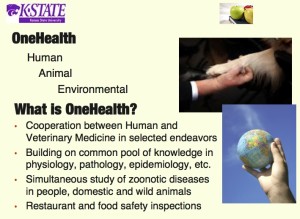We had lunch yesterday with a friend from Slovenia.
She had been a researcher at a university there, and then moved to Brisbane and worked in the private sector before landing another research job at a uni.
She said, Doug, don’t you want to try and get a uni job here in Australia?
No. I’m done with universities.
But I do miss the students, although I still get to interact with several.
 Dr. Maureen Birmingham, a 1983 graduate of the UI College of Veterinary Medicine, is the kind of student I miss.
Dr. Maureen Birmingham, a 1983 graduate of the UI College of Veterinary Medicine, is the kind of student I miss.
Describing herself as a “fortunate victim of a lot of fortunate opportunities,” Birmingham has been all around the world helping to prevent and resolve disease — in both people and animals.
After veterinary school, Birmingham worked as a clinician in a large animal practice in upstate New York for a few years but realized that she wanted something else from her career.
“Every other night, I was on call,” she said. “It was not sustainable in the long term but a wonderful experience for locking in my veterinary skills and the art of veterinary practice as well as building communication skills with clients.”
She spent the late 1980s working for nongovernmental organizations, first in Haiti and later in Bolivia, where she taught veterinary technicians critical skills to help subsistence farmers improve their economic situation.
“In rural Haiti, families kept a pig as their living savings account, to be cashed in for special circumstances, like paying for school or an unforeseen family crisis or event. So pigs were critical to the rural economy,” said Birmingham, who was part of a program to reintroduce pigs to the island after all had been slaughtered to eradicate African swine fever there.
 “In Bolivia, we taught veterinary technicians not only about basic veterinary medicine and animal husbandry but also about how to maximize the fiber yield from alpacas and meat from guinea pigs for better profits,” Birmingham said. “Bolivians raise guinea pigs as a cost-effective and traditional food source, so we helped them manage these animals as well.”
“In Bolivia, we taught veterinary technicians not only about basic veterinary medicine and animal husbandry but also about how to maximize the fiber yield from alpacas and meat from guinea pigs for better profits,” Birmingham said. “Bolivians raise guinea pigs as a cost-effective and traditional food source, so we helped them manage these animals as well.”
Over the next several years, she and Dr. Peter Quesenberry, a veterinarian who spent most of his life working in Asian countries, wrote “Where There Is No Animal Doctor,” a manual on basic measures to prevent and treat animal diseases for people living in remote areas around the world.
The next phase of Birmingham’s career was earning a master’s degree in public health at Harvard. From there, she joined the Epidemic Intelligence Service (EIS), part of the Centers for Disease Control and Prevention (CDC), and was deployed to Africa for most of the next two years to work on child-survival issues.
“This EIS program provides excellent training in field epidemiology, for example, by participating on the frontline in outbreak investigations both domestically and internationally. Some of the more well-known investigations of EIS officers include the emergence of Legionnaires’ disease, polio, cholera, Ebola, HIV/AIDS, West Nile virus and influenza, as well as the public health aspects of disasters such as Hurricane Katrina to name a few,” she said.
Eventually, the CDC transferred Birmingham to Geneva, Switzerland, to work on global polio eradication in a program led by the World Health Organization (WHO). She and her husband spent the next 12 years in Geneva, where she completed a CDC residency program in preventive medicine and cultivated her skills as an epidemiologist, manager and administrator.
From there, Birmingham and her husband moved to Bangkok, Thailand, to get closer to fieldwork.
After more than six years in Thailand, she moved with her family to become a WHO/Pan American Health Organization (PAHO) representative to Mexico.
“My role now is as a generalist, managing the various WHO/PAHO programs of cooperation with the government,” Birmingham said. “My team delves into all sorts of topics, such as environmental health including pesticide/chemical management, strengthening preparedness and response to public health emergencies, addressing the health effects of climate change, applying public health approaches to reduce violence, addiction prevention/treatment, reducing maternal mortality, reducing the very high rates of road injuries and addressing childhood obesity and the soaring diabetes rates.”
Promoting public health is a collective effort among many sectors. Veterinarians like Birmingham play an important role. Moreover, the One Health movement seeks to bring animal and human health fields closer together to better predict, prevent and control emerging diseases, given that 75 percent of all emerging diseases in humans come from animals. Veterinarians are well-positioned to address this problem.
“Even something as simple as effective public communications to wash hands for the prevention of bird flu makes a difference,” she said. “Veterinarians are very relevant in public health.”
